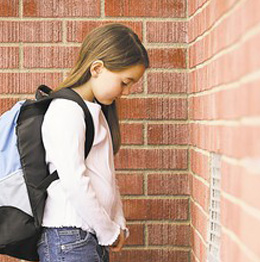Did you know that school refusal in children is usually about anxiety?
Children of all ages, genders, ethnicities and races can develop school refusal behavior. The most common age of onset is 10-13 years old, but children of all ages can struggle with anxiety surrounding attending school.
One in four children may occasionally refuse to attend school. Such behavior can become a more long term concern if left untreated. Many children with school refusal have a history of separation anxiety, generalized anxiety, social anxiety or depression. Some children have a history of being bullied in school or have a fear of throwing up in school. Undiagnosed learning disabilities or reading disorders may also play a role in the development of school refusal.
Children with school refusal sometimes complain of stomachaches, headaches and or feeling hot or dizzy when it is time to go to school. After these symptoms have been investigated by a doctor and no medical cause can be found, children are then diagnosed with somatic complaints due to anxiety and said to be suffering from physical manifestations of their worries.
Anxiety becomes worse with avoidance. Therefore, the more a child misses school, avoids school or is asked to be picked up early from school, the worse their anxiety becomes over time. It is important to work with your child’s school and or therapeutic treatment providers to develop a plan to help your child attend school. It is also important to have loving yet firm boundaries with your child in terms of developing expectations for attending school.
Cognitive behavioral techniques (CBT) are frequently used in both individual and group treatment modalities to help children work to develop coping skills and talk back to their worries. Parents should also be involved in treatment to help children utilize their coping skills at home and school and to provide limits and boundaries regarding attending school. Collaboration with your child’s school is also important.
It is important to remember that most children who exhibit school refusal have average to above average intelligence and through early intervention therapy and school support, can develop healthy coping skills to better manage their anxiety.
If your child is struggling with going to school we can help We will work with you, your school and child to help them learn coping skills and feel comfortable to go back to school.
